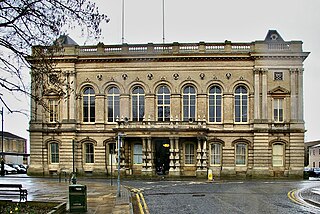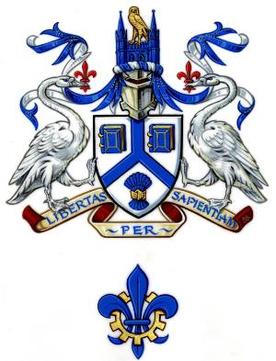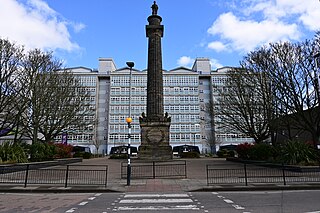
North East Lincolnshire is a unitary authority area with borough status in Lincolnshire, England. It borders the borough of North Lincolnshire and districts of West Lindsey and East Lindsey. The population of the district in the 2011 Census was 159,616. The administrative centre and largest settlement is Grimsby and the borough includes the towns of Cleethorpes and Immingham as well as the villages of New Waltham, Waltham, Humberston, Healing and Great Coates. The borough is also home to the Port of Grimsby and Port of Immingham as well as Cleethorpes beach.

Grimsby or Great Grimsby is a port town and the administrative centre of North East Lincolnshire, Lincolnshire, England. Grimsby adjoins the town of Cleethorpes directly to the south-east forming a conurbation. Grimsby is 45 mi (72 km) north-east of Lincoln, 33 mi (53 km) south-south-east of Hull, 28 mi (45 km) south-east of Scunthorpe, 50 mi (80 km) east of Doncaster and 80 mi (130 km) south-east of Leeds. In 2021 it had a population of 86,138.

The City and Guilds of London Institute is an educational organisation in the United Kingdom. Founded on 11 November 1878 by the City of London and 16 livery companies to develop a national system of technical education, the institute has been operating under royal charter, granted by Queen Victoria, since 1900. The Prince of Wales, later King Edward VII, was appointed the first president of the institute.

The University of Lincoln is a public research university in Lincoln, England, with origins dating back to 1861. It gained university status in 1992 and its present name in 2001. The main campus is in the heart of the city of Lincoln alongside the Brayford Pool. There are satellite campuses across Lincolnshire in Riseholme and Holbeach and graduation ceremonies take place in Lincoln Cathedral.

Lincoln College is a predominantly further education college based in the City of Lincoln, England.

The Hull School of Art and Design is an art school in Kingston upon Hull, in the East Riding of Yorkshire, England.
North Lindsey College is a further education college in Scunthorpe, North Lincolnshire, England, situated on the A18.

Tyne Metropolitan College is a college of further education in North Tyneside, England.
NorthTec is a tertiary education provider in northern New Zealand, with its main campus in Raumanga, Whangārei. NorthTec provides programmes ranging from foundation, certificate, diploma and degree levels. The degrees are nationally monitored and so can lead to postgraduate study at universities and other organisations. NorthTec works closely with local and national industries.

Selby College is a tertiary college, offering A Level courses through its Sixth Form Academy, work-related vocational courses, apprenticeships, business training and adult education courses. It is located in Selby, North Yorkshire, England. The College is a provider of A levels and vocational education for sixteen to eighteen year olds. Selby provides apprenticeships, higher education including foundation degrees, honours degrees and HND/HNC level qualifications as well as workforce training.

Wiltshire College & University Centre is a tertiary college of education founded in 2002 by the merger of Chippenham Technical College, Lackham College and Trowbridge College. Consolidation was completed with the merger of Salisbury College, which commenced in January 2008. In 2020-21 the institution offered over 1,000 courses and had approximately 3,300 full-time and 6,000 part-time students, with over 800 enrolled on degree-level courses.

Hull College is a Further Education and Higher Education establishment based in Kingston upon Hull, England.
KTG Education Group is a private college in Malaysia. Its main campus is located in Mantin, Negri Sembilan. The college offers undergraduate and graduate degrees, including a master's degree in IT, engineering and business. KTG and Leeds Beckett University (UK) partner to offer a British qualification at KTG's main campus. The campus enrolls approximately 3,500 students, with about 30% of them from other countries.

East Riding College is a further education college located in the East Riding of Yorkshire, England. It is a part of the TEC Partnership.

Reaseheath College is a land-based further education college offering a range of diplomas, apprenticeships, and adult courses. It is mainly located on the outskirts of Nantwich in Cheshire, England.

Scarborough TEC, is a further education college located on Filey Road Scarborough, North Yorkshire, England. It is a constituent college of the Grimsby Institute of Further & Higher Education.
Education in Kingston upon Hull is governed by the unitary authority of Kingston upon Hull.

The Sri Lanka Institute of Advanced Technological Education is a statutory body in Sri Lanka coming under the purview of the Higher Education Ministry and offering Higher National Diploma courses. At present, it manages and supervises eighteen provincial Advanced Technological Institutes throughout the island. The institute is traditionally known for its education in the accountancy and engineering. As per the recommendations of the Committee appointed by Prof. Wiswa Waranapala, Deputy Minister of Higher Education in 1994, the Sri Lanka Institute of Advanced Technical Education (SLIATE) was formed in 1995, under the Sri Lanka Institute of Advanced Technical Education Act No. 29 of 1995. In 2001, the name of the institution was amended as Sri Lanka Institute of Advanced Technological Education (SLIATE).

















